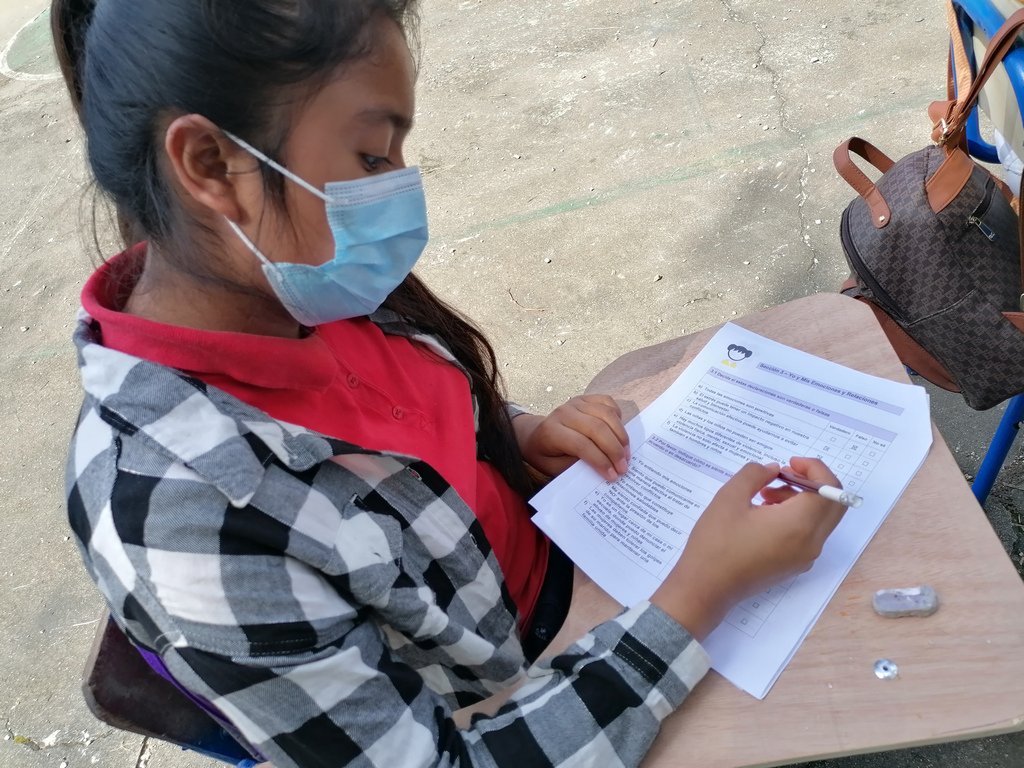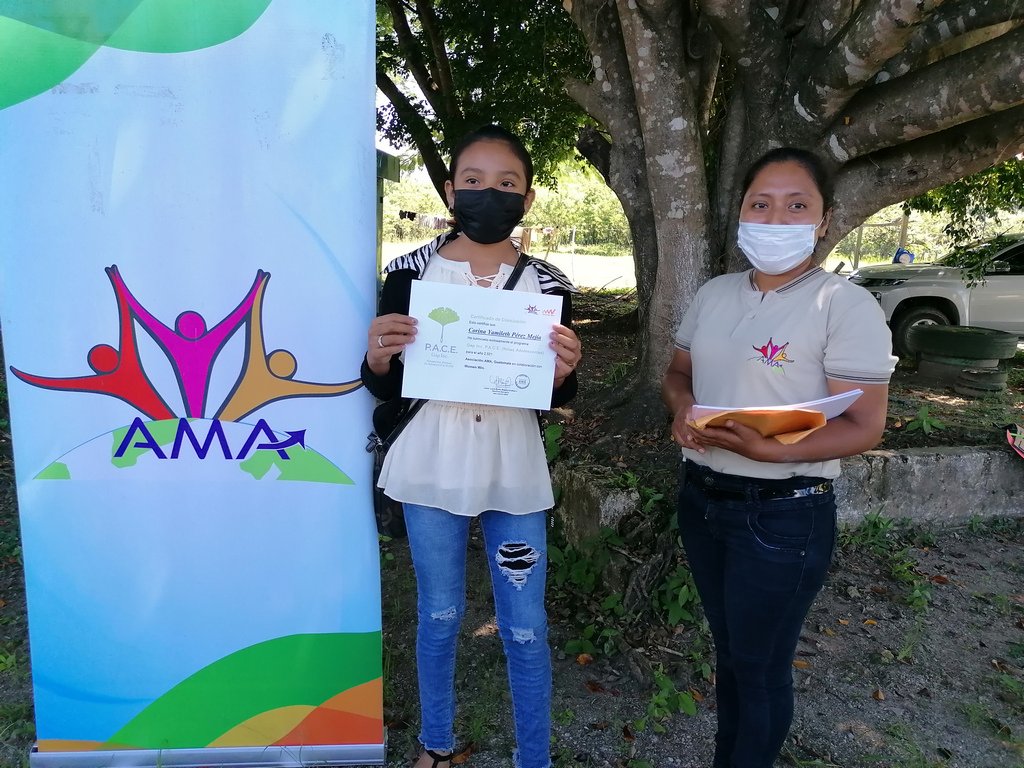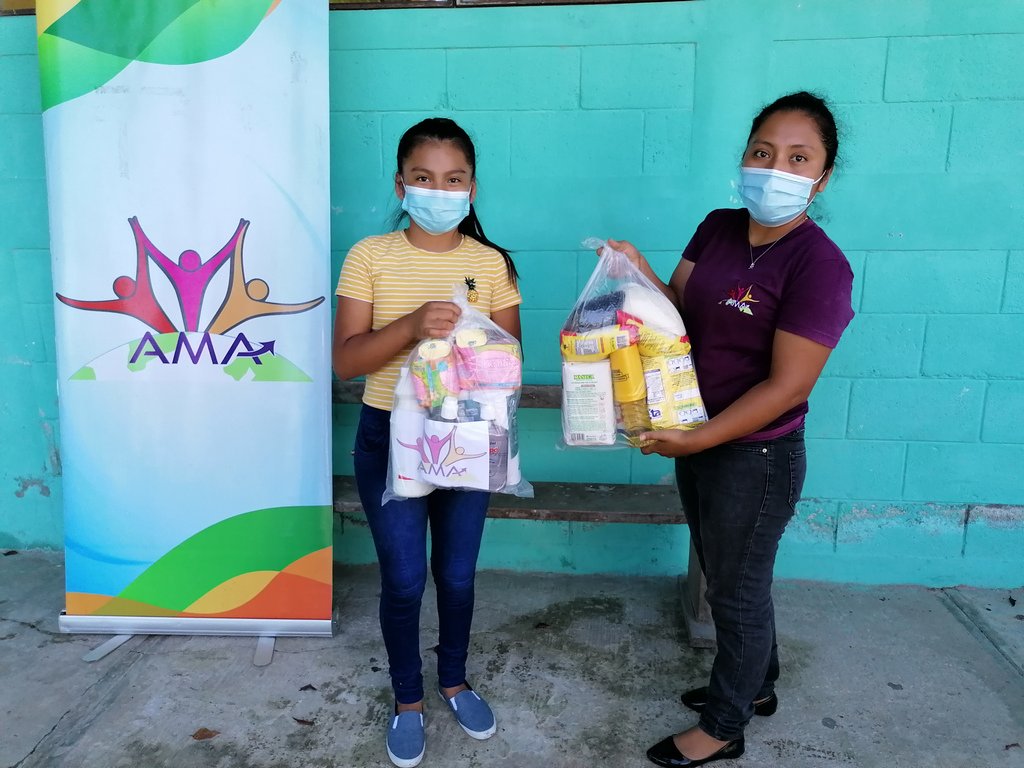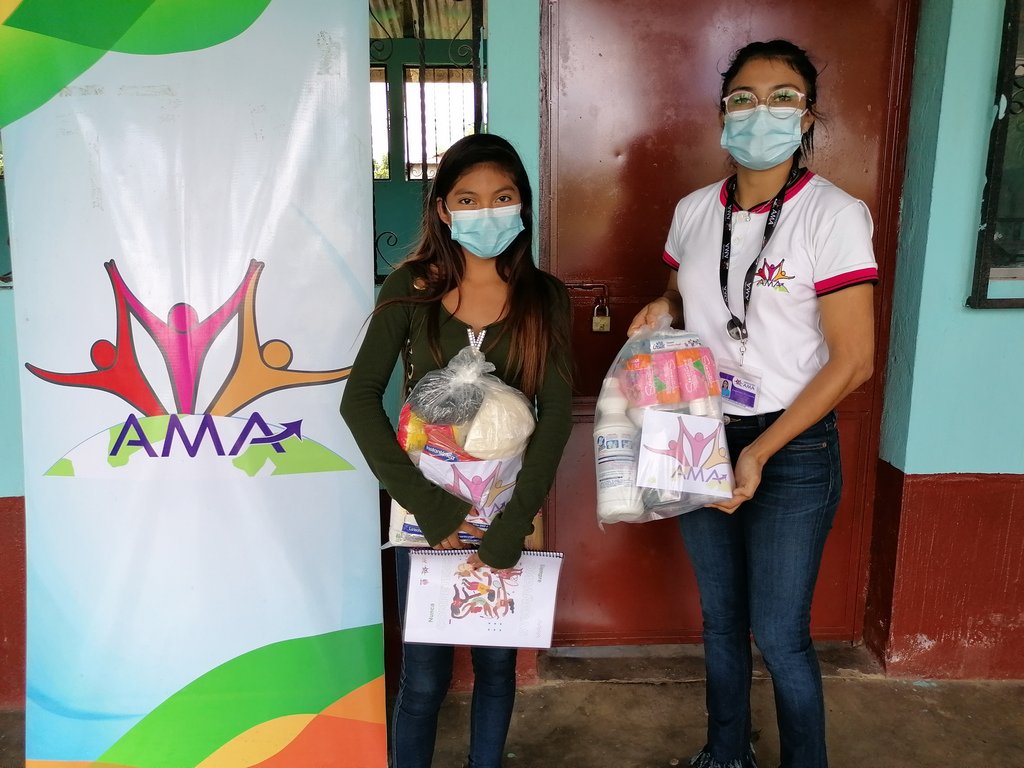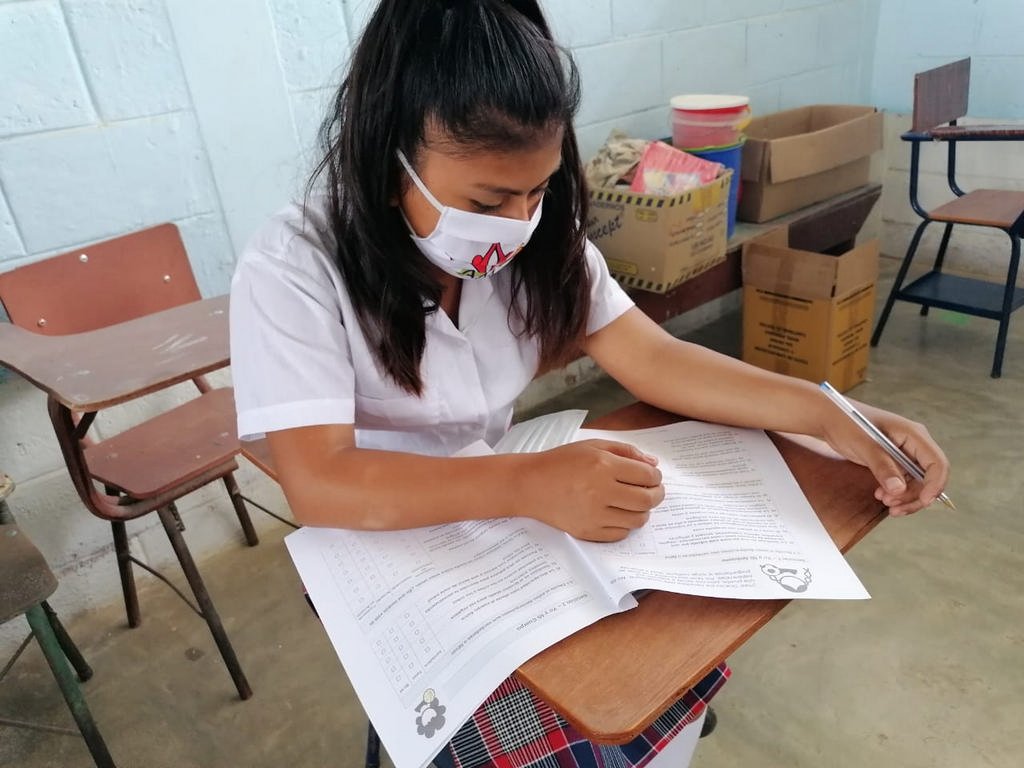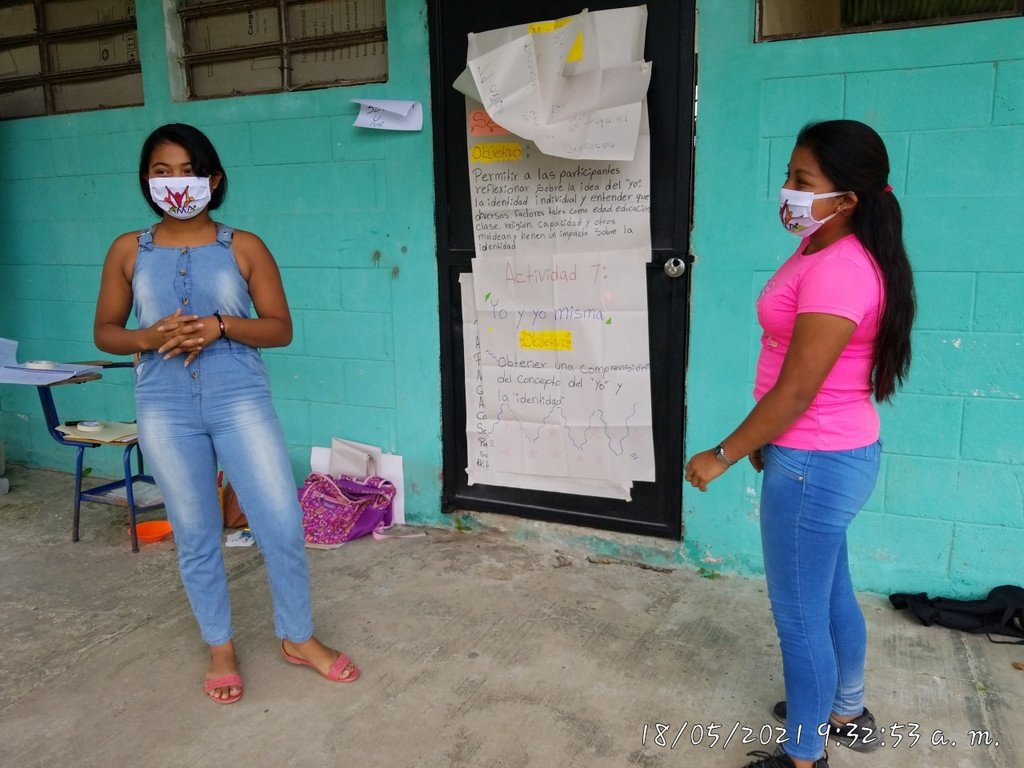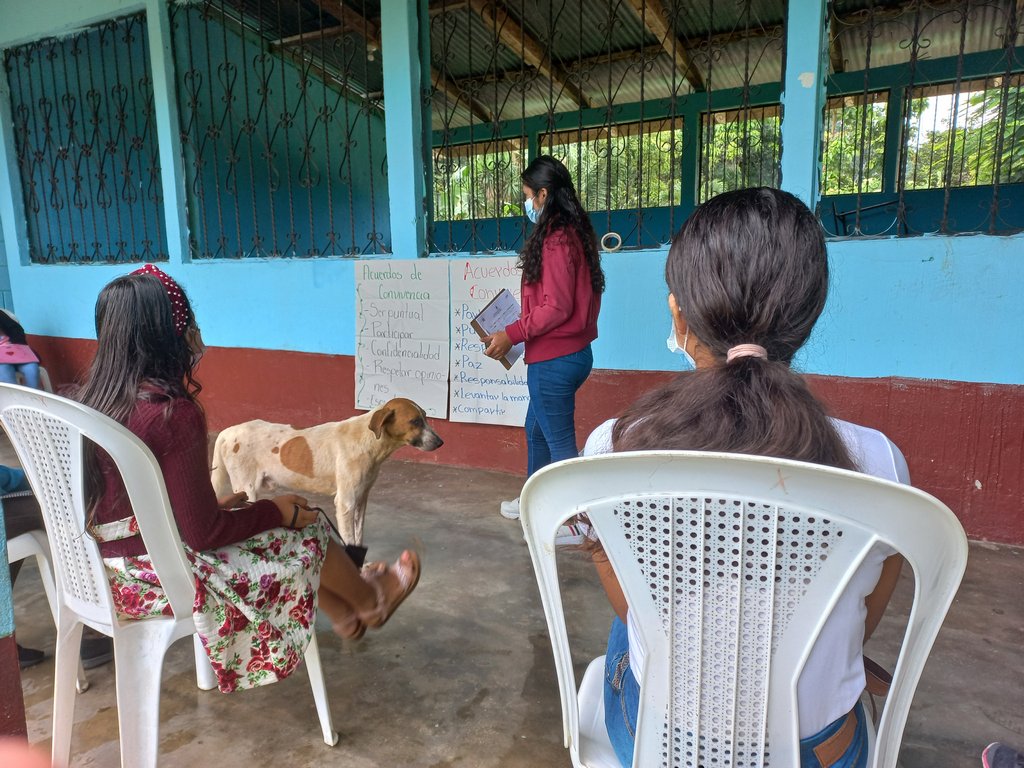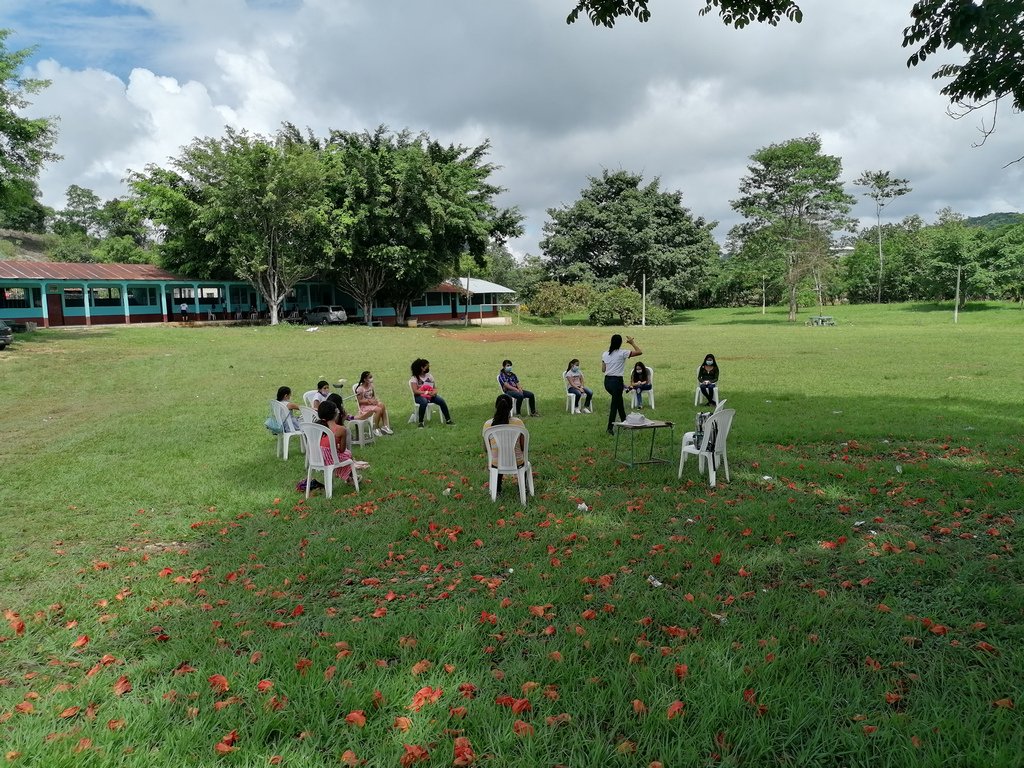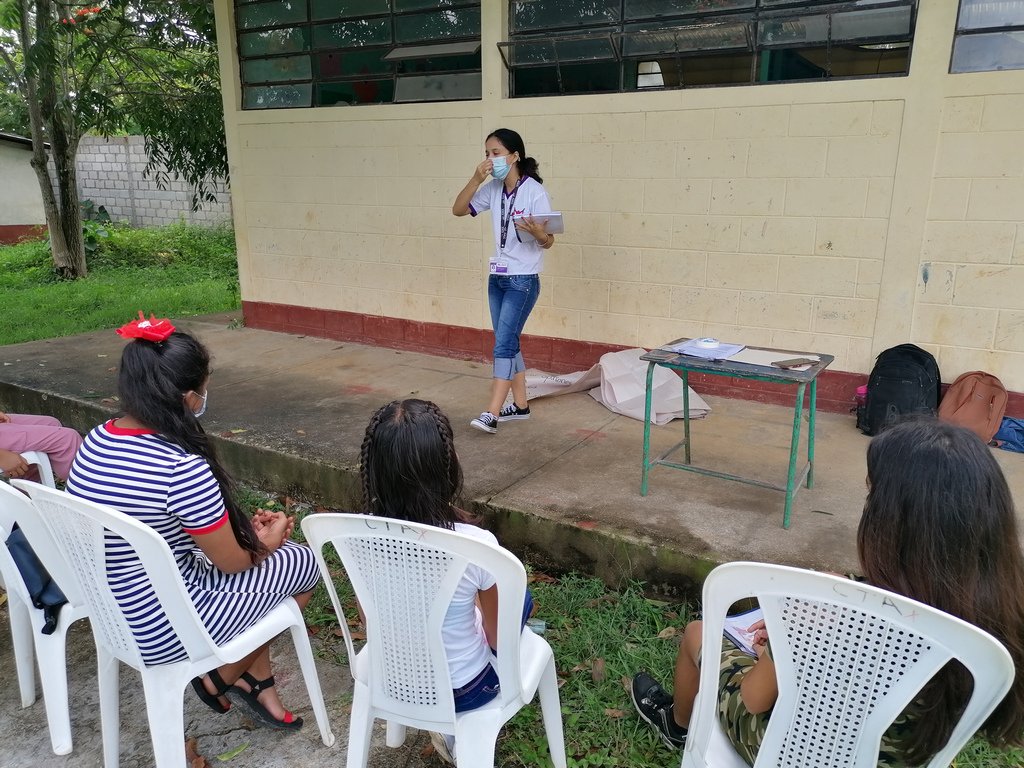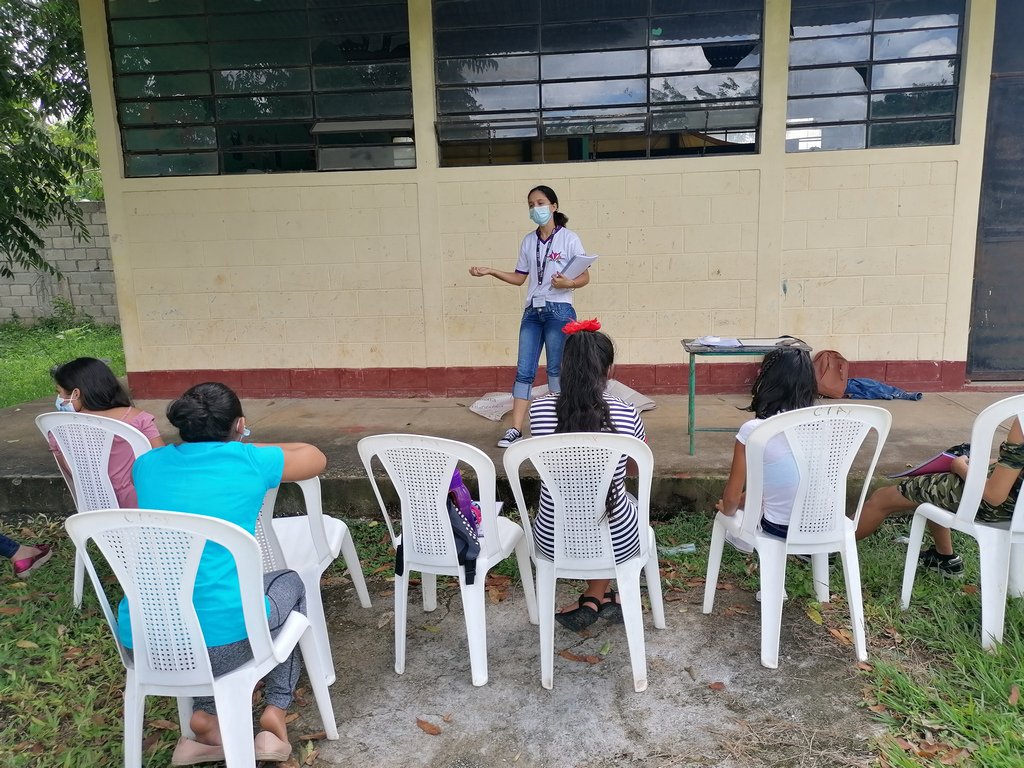
Project Name:
Play It Forward and PACE Girls and Resilience AMA Association (2020-2021)
Start Date: February/2020
End Date: December/2021
102 girls volunteers
The Play It Forward, PACE Girls, and Resilience AMA Association project was developed during the pandemic, adapting its original idea to the COVID-19 context in Guatemala. The project focused on strengthening life skills, leadership development, and sports practice (soccer) for 102 girls aged nine to 13, of Maya Q’eqchí and Ladino origin from schools in the Santa Bárbara neighborhood, Machaquilá, Ixobel neighborhood, and Santa María neighborhood in Poptún, Petén, Guatemala.
Additionally, the project included activities to strengthen food security, nutrition, access to COVID-19 prevention supplies, menstrual hygiene, and health. It also supported AMA's organizational resilience during the economic crisis caused by the pandemic.
The project was carried out in partnership with the Departmental Directorate of Education (DIDEDUC) of Petén, Women Win, and the Summit Foundation. It was implemented using a hybrid methodology, combining face-to-face and remote work. The following activities were carried out:
Activities 2020-2021
Three coordination meetings were held with the educational community of the three participating schools in the “Personal Development & Professional Strengthening (PACE-Girls)" program from the Ixobel neighborhood, Santa María neighborhood, and Santa Bárbara neighborhood, Poptún, Petén.
At these meetings, directors, teachers, and parents were informed about the importance of the program and its benefits for developing life skills. COVID-19 biosecurity protocols were also discussed.
In these meetings, it was noted that the mothers, upon learning about the topics addressed, mentioned that talking to the girls about their development and physical changes was very important, as they felt embarrassed or did not know how to approach subjects such as violence, menstruation, how babies are born, and sexual-genital relations, so they considered it appropriate to have discussions about these topics.
Mothers expressed confidence because they could review all the topics their daughters would learn from the workbook. The knowledge reached families and served as a new source of information for teachers.
It is of utmost importance to mention that coordination meetings were also held with the officials of the Departmental Directorate of Education in Flores, Petén, and the Coordinators of the School Districts in Poptún, as their consent and involvement facilitate the participation of schools. Additionally, the program needs to be authorized by them during pandemic times.
It should be noted that AMA signed a cooperation agreement with the Senior Office of the Ministry of Education, which has greatly strengthened the development of the program. Monthly reports are presented to this ministry on the program's progress, which are then forwarded to the Education Commission of the Congress of the Republic of Guatemala.
In collaboration with Coincidir and Women Win, the PACE Girls program booklet was designed, covering modules like "Me and My Environment," "Me and My Body," "Me and My Emotions and Relationships," and "Me and My Aspirations."
The booklets were given to 102 adolescent girls from the Ixobel neighborhood, Santa María neighborhood, and Santa Bárbara neighborhood, Poptún, Petén, after approval and binding.
The aforementioned greatly strengthened the teaching-learning process, as the participants had a working document through which they could reinforce at home the knowledge learned in the interactive training sessions. Additionally, parents and teachers monitored the content received by the girls, so the knowledge reached family units and also served as a new source of information for the teachers of the beneficiary schools.
24 interactive training sessions were held for 102 adolescent Maya Q’eqchí and mestizo girls from schools in the Santa Bárbara neighborhood, Machaquilá, Ixobel neighborhood, and Santa María neighborhood, Poptún, Petén, Guatemala.
The girls were divided into nine groups, three groups per school, to comply with COVID-19 physical distancing protocols.
Each group had eight interactive training sessions of four hours each, focused on the modules of the Personal Development & Professional Strengthening (PACE-Girls) program.
The sessions were developed by two trainers and two Maya Q’eqchí and Mestizo assistants graduated from the PACE-Women program, who used an interactive-deductive "learning by doing" methodology, aiming to make the teaching-learning process practical, enjoyable, and to develop critical thinking in the participants.
It is worth mentioning that the three primary schools also participate in the project "My Dignified and Safe Return to School" carried out by AMA in partnership with the Tinker Foundation. The objective is to strengthen the process of returning to schools safely within the framework of the COVID-19 pandemic. Therefore, the teachers received a diploma for the implementation of methodologies for distance education, and the schools received supplies for COVID-19 prevention.
Three deliveries of groceries and hygiene kits were made to the 102 adolescent girls from the participating schools (one delivery per school). This was done to strengthen food and nutritional security, as well as menstrual hygiene and COVID-19 prevention among the adolescent girls and their families participating in the program.
The entry of Tropical Storms Eta and Iota added to the difficulties already faced by adolescent girls and women in Guatemala, which had been intensified by the COVID-19 pandemic, especially in rural communities and indigenous marginal urban areas living in poverty, such as the intervention communities.
Nine educational videos about the PACE Girls program were produced, through which the teaching-learning process of the adolescent girls and their families participating in the program was strengthened.
The videos were made by the program's trainers and were sent to the directors and teachers of the three participating schools, who distributed them to the parents of the girls participating in the program as well.
These videos were also sent by the teachers of other educational grades to the children of the three participating schools, so the program has helped to strengthen the knowledge of more than 400 girls and boys studying in these schools.
The videos focused on the modules of the PACE program, which helped to strengthen and continue the process. Additionally, they kept the adolescent girls and their families engaged, as the videos were watched within the family units.
These videos were also sent to adolescent girls and young women participating in the Play It Forward and PACE Girls and PACE Women programs, which were conducted by the AMA Association with 113 adolescent girls and 42 young women from Southern Petén.
The binding of comics on Anxiety and Stress and María and Menstruation was carried out by the team of the AMA Association, who subsequently delivered them to the 102 adolescent girls from the three schools participating in the PACE Girls program, greatly strengthening the teaching-learning process.
The comics were well received by the participants; it was observed that before starting the sessions and in their free time, they read them, discussed the content among themselves, and consulted with the trainers about the content and whether they could share it with their younger siblings and friends at home and in their neighborhoods.
Therefore, it was undoubtedly of interest, pleasing, and very much liked by the adolescent girls.
Results Achieved 2020-2021
- Workshops for Strengthening Sports Methodologies
Eight indigenous and mestizo trainers from the AMA Association, who benefited from workshops on sports methodologies, which enabled them to enhance their skills in this area.
- Interactive Training Sessions
102 adolescent Maya Q’eqchí’ and mestizo girls from the schools in the Santa Bárbara, Machaquilá, Ixobel, and Santa María neighborhoods, in the municipality of Poptún, Petén department, Guatemala.
- Educational Videos
The 650 adolescent girls and boys, students of the three participating primary schools in the project, to whom the educational videos on life skills and sports were distributed.
- Food Supplies and Hygiene Kit Delivery
The indirect beneficiaries are the 102 families of the young indigenous and mestizo women who participated in the project, who benefited from the distribution of basic food items and personal hygiene supplies delivered to the participants.
Volunteering:
102 adolescent Maya Q’eqchí’ and mestizo girls from the schools in the Santa Bárbara, Machaquilá, Ixobel, and Santa María neighborhoods, in the municipality of Poptún, Petén department, Guatemala.
With the implementation of the program, it has been evidenced through the development of activities, worksheets contained in the modules and booklet, the evolution that the girls have had during the progress of the thematic sessions.
After carrying out the systematization process of pre and post-test questionnaires, it is possible to reflect this improvement in the participating girls through percentage data. It shows that, at the beginning of the program, the girls demonstrated through the pre-tests 57.12% knowledge about life skills and girls' rights.
Whereas after completing the program, the results of the post-test reflect 98.03% knowledge about life skills and girls' rights.
We achieved positive changes in the participants of the PACE GIRLS program, as they acquired knowledge about identity, communication, learned about their bodies (respecting and taking care of them to keep them healthy), can now easily identify and control their emotions, and are also capable of making their own decisions, setting goals, and striving for them. All this was reflected in the post-questionnaire they answered in the last interactive training circle, as their learning percentage increased significantly compared to the pre-questionnaire they answered in the first circle.
Some girls who initially did not express their opinions, as the topics progressed, gained confidence and self-assurance, making them always want to give their opinion voluntarily, of course, practicing effective communication, which was one of the topics they learned to manage. It was also noticeable that they had a lot of fun learning.
The participants, belonging to families living in poverty, with low educational levels, and who have possibly suffered from domestic violence, have deep-rooted ideas related to gender roles. For example, they believed that as they grow into adolescence and youth, it is necessary to form a family, and they should know how to perform domestic activities so that “the man” would not get upset with them, a notion that changed during the process.
Through the "Me and My Environment" module, they learned to identify everything that is included when talking about identity, how it is divided between what others see and think and what they see and think of themselves. This has helped them to stand firm in defending their thoughts despite societal expectations. For example, they now believe that they can also graduate from a university career, have the right to be free, and that men should support domestic chores. As a result, both the girls and their mothers have mentioned that in their homes, they now ask their fathers and brothers to help with sweeping or washing clothes.
With the "Me and My Body" module, they understood the functioning of the reproductive system in both women and men, the physical changes they experienced and will experience upon reaching puberty, about menstruation, and care and hygiene during it. They debunked myths that promote harmful practices such as early pregnancies, as it is commonly said in the intervention neighborhoods that the arrival of menstruation is a sign of becoming a woman and that one can become a mother.
This has changed, as they now think that it is not good to have a husband too quickly, that they are not prepared physically, emotionally, or professionally. They know that they are the only ones who can decide about their bodies and that nobody should touch it without their consent.
They also believed that their menstrual period limited them from doing many things, such as playing sports, mainly due to beliefs. Now, they say that nothing stops them, that the menstrual period is something natural, and they can do what they wish like any other day.
Among them, there were also girls who had never had their period, so they were taught about sanitary pads, how they work, and the importance of maintaining proper hygiene during and after their menstrual days.
With the "Me, My Emotions, and Relationships" module, first and foremost, they learned to communicate by taking their emotions into account, recognizing when a relationship is healthy, including romantic relationships as well as family, friendships, and community ties. They learned to avoid situations of violence and how to act if they find themselves in a relationship where they suffer physical, psychological, or sexual violence.
With the "Me and My Aspirations" module, they were able to identify their dreams, express them confidently, and also received ideas on how they could achieve them. They learned about human rights and are aware that they must always be respected.
The donor who funded this project



